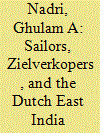| Srl | Item |
| 1 |
ID:
168573


|
|
|
|
|
| Summary/Abstract |
The Aru Islands in southeastern Maluku have a long history of economic exchange and colonial relations with the Dutch East India Company (VOC), and later the Dutch colonial state. Aru was fragmented in smaller autonomous settlements, of which those in the east produced valuable items for export, such as pearls and tripang (edible sea cucumber). The article focuses on a spate of anti-colonial revolts in the waning days of the VOC in the 1790s. It centred on the Batuley villages situated on a few small islands on the eastern side. The central incident leading to the resistance was the killing of a Dutch low-ranking officer, Scheerder, an event which has been preserved in local tradition till the present day. A search in the VOC archives confirms several details, but suggests a rationale for the resistance which is partly different from the traditional version, and linked in with larger movements of resistance in Aru and Maluku. The article discusses the significance of the oral traditions, and how a comparison with archival materials can enrich our understanding of Arunese–Dutch relations.
|
|
|
|
|
|
|
|
|
|
|
|
|
|
|
|
| 2 |
ID:
139674


|
|
|
|
|
| Summary/Abstract |
In the second half of the eighteenth century, the Dutch East India Company (VOC) employed hundreds of Indian sailors in Surat in western India to man its ships plying the Asian waters. The Moorse zeevarenden (Muslim sailors) performed a variety of tasks on board ships and in the port of Batavia, and made it possible for the Company to carry out its commercial ventures across the Indian Ocean. The relationship between the two, however, was rather complex and even contentious. Based on Dutch sources, this article investigates the political-economic contexts of this relationship, examines the structure and organization of the maritime labour market in Surat, and illuminates the role and significance of zielverkopers (labour contractors) and of the local administration. The analysis of the social, economic, and familial aspects of the market and labour relations in Surat sheds light on pre-capitalist forms of labour recruitment and the institutional dynamics of the Indian labour market.
|
|
|
|
|
|
|
|
|
|
|
|
|
|
|
|